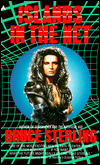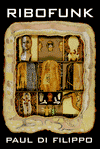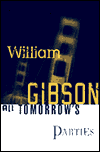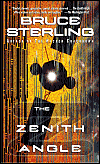
Islands in the Net, by Bruce Sterling
Book Review by Jack Mangan
Have you read this book?
This review was written in 2005.
Who can accurately predict today what life will be like in 2023? It's a staple of Science Fiction works set in the future to guess at the implemented technologies, cultural trends, and political landscapes of tomorrow. It's a dicey game to play though, as a writer, to throw out bold predictions which may make your story obsolete within a few years. For example: Sci-Fi stories of the 70s and especially the 80s often transplanted the Cold War, i.e., USA vs. USSR, into the far future. This tends to taint post-Soviet collapse readings of these works; as good (or poor) as the story may be, you suddenly find yourself reading an alt-history set in the future. So what does this have to do with Bruce Sterling's breakout novel, Islands in the Net? The book was published in 1988, and makes literally hundreds of predictions about future cutting edge tech, as well as global and daily life in the 2020s. Some of these have already been invalidated by history; for example, if human societies progress on their current courses, then it seems unlikely that any music or video will be recorded onto any kind of tape, as if often depicted in "Islands." I imagine that hip, city-dweller types will have easier access to portable, personal phones. I also doubt if African nomads with high-tech equipment will look for global news via faxfeeds; they'll probably just be able to check websites.
But - to harp on these few, minor inaccuracies would be entirely missing the point. Fortunately, none of the aforementioned anachronistic guesses affect the larger story. What's astonishing about Islands in the Net is what Mr. Sterling got right, nearly twenty years ago. It was pretty bold in the latter 80s to predict the irrelevance of the Russians (and who cares if the mostly obsolete word Soviet makes one appearance?). Was anyone else writing fiction back then that eerily echoes the current atmosphere of nationless terrorist groups, data havens, and corporations playing at the same table as major national governments? The contemporary reader will find that these dead-on forecasts far outweigh the discrepancies, and are far more relevant and powerful.
We follow the story of Laura Webster; she and her husband David are idealistic young members of the Rizome economic democratic corporation. Through a goodwill effort of Rizome's, they become embroiled in international hostilities involving corrupt data havens in Grenada and Singapore, which grows to include the bureaucratic Viennese global police force, as well as a number of small terrorist and political groups; some of which bear a slight, chilling resemblance to Al Qaeda. The conflicts immerse them in a nasty underworld that they didn't even know existed, which then put them in harm's way amidst horrific, violent, nation-shattering coups; terrorist-initiated mass-hysteria. Yes, this was written nearly 20 years ago. They are eventually torn apart, and Laura is cast adrift in this crazy, lawless world within a world, desperate to get back to the safety and security of "The Net"; the world where she used to live. She finds herself out of control of her own fate, tossed from place to place at the whim of others. The scenes in Singapore are riveting and unforgettable.
The Cyberpunk genre (which isn't dead, but has been absorbed into its parent genre) saw only a handful of good films (I only count 2), but a number of great books. The four most important are "Neuromancer," by William Gibson, "City Come A-Walkin'," by John Shirley, "Snow Crash," by Neal Stephenson, and Islands in the Net, by Bruce Sterling. These are the cornerstones of the sleek, mirror-windowed, Japanese skyscraper that is Cyberpunk. "Islands" stands out though, even amongst its own kind. While it adheres to some of the genre's maxims; the protagonist, Laura Webster encounters numerous varieties of high-tech lowlifes, and all along we witness the street finding its own uses for innovations; it also deviates in a few important ways. Laura is a decidedly un-street-savvy corporate type, with no aura of edgy cool or low desperation. She doesn't stick it to "The Man" -- she is "The Man" -- and there is no transformation for her into a lowlife, Molly-like, cyberwarrior street samurai. She does shed much of her na´vete throughout the book, but she mostly remains that idealistic, familiar Western suburbanite who we met jogging on the beach on page 1.
But this keeps us close to her, through her naivetes, her terrifying ordeals, and her tribulation. The reader understands her choices, and in spite of the occasional obsolete prediction, we recognize and understand her world. Bruce Sterling takes her, and the reader on an eye-opening, scary trip through this whole prophetic setting, which, if your mind is open to it, will leave your view of Science Fiction -- and Cyberpunk -- forever changed.
Who can accurately predict today what life will be like in 2023? It's a staple of Science Fiction works set in the future to guess at the implemented technologies, cultural trends, and political landscapes of tomorrow. It's a dicey game to play though, as a writer, to throw out bold predictions which may make your story obsolete within a few years. For example: Sci-Fi stories of the 70s and especially the 80s often transplanted the Cold War, i.e., USA vs. USSR, into the far future. This tends to taint post-Soviet collapse readings of these works; as good (or poor) as the story may be, you suddenly find yourself reading an alt-history set in the future. So what does this have to do with Bruce Sterling's breakout novel, Islands in the Net? The book was published in 1988, and makes literally hundreds of predictions about future cutting edge tech, as well as global and daily life in the 2020s. Some of these have already been invalidated by history; for example, if human societies progress on their current courses, then it seems unlikely that any music or video will be recorded onto any kind of tape, as if often depicted in "Islands." I imagine that hip, city-dweller types will have easier access to portable, personal phones. I also doubt if African nomads with high-tech equipment will look for global news via faxfeeds; they'll probably just be able to check websites.
But - to harp on these few, minor inaccuracies would be entirely missing the point. Fortunately, none of the aforementioned anachronistic guesses affect the larger story. What's astonishing about Islands in the Net is what Mr. Sterling got right, nearly twenty years ago. It was pretty bold in the latter 80s to predict the irrelevance of the Russians (and who cares if the mostly obsolete word Soviet makes one appearance?). Was anyone else writing fiction back then that eerily echoes the current atmosphere of nationless terrorist groups, data havens, and corporations playing at the same table as major national governments? The contemporary reader will find that these dead-on forecasts far outweigh the discrepancies, and are far more relevant and powerful.
We follow the story of Laura Webster; she and her husband David are idealistic young members of the Rizome economic democratic corporation. Through a goodwill effort of Rizome's, they become embroiled in international hostilities involving corrupt data havens in Grenada and Singapore, which grows to include the bureaucratic Viennese global police force, as well as a number of small terrorist and political groups; some of which bear a slight, chilling resemblance to Al Qaeda. The conflicts immerse them in a nasty underworld that they didn't even know existed, which then put them in harm's way amidst horrific, violent, nation-shattering coups; terrorist-initiated mass-hysteria. Yes, this was written nearly 20 years ago. They are eventually torn apart, and Laura is cast adrift in this crazy, lawless world within a world, desperate to get back to the safety and security of "The Net"; the world where she used to live. She finds herself out of control of her own fate, tossed from place to place at the whim of others. The scenes in Singapore are riveting and unforgettable.
The Cyberpunk genre (which isn't dead, but has been absorbed into its parent genre) saw only a handful of good films (I only count 2), but a number of great books. The four most important are "Neuromancer," by William Gibson, "City Come A-Walkin'," by John Shirley, "Snow Crash," by Neal Stephenson, and Islands in the Net, by Bruce Sterling. These are the cornerstones of the sleek, mirror-windowed, Japanese skyscraper that is Cyberpunk. "Islands" stands out though, even amongst its own kind. While it adheres to some of the genre's maxims; the protagonist, Laura Webster encounters numerous varieties of high-tech lowlifes, and all along we witness the street finding its own uses for innovations; it also deviates in a few important ways. Laura is a decidedly un-street-savvy corporate type, with no aura of edgy cool or low desperation. She doesn't stick it to "The Man" -- she is "The Man" -- and there is no transformation for her into a lowlife, Molly-like, cyberwarrior street samurai. She does shed much of her na´vete throughout the book, but she mostly remains that idealistic, familiar Western suburbanite who we met jogging on the beach on page 1.
But this keeps us close to her, through her naivetes, her terrifying ordeals, and her tribulation. The reader understands her choices, and in spite of the occasional obsolete prediction, we recognize and understand her world. Bruce Sterling takes her, and the reader on an eye-opening, scary trip through this whole prophetic setting, which, if your mind is open to it, will leave your view of Science Fiction -- and Cyberpunk -- forever changed.
|
Click here to buy Islands in the Net, by Bruce Sterling on Amazon
|
Islands in the Net, by Bruce Sterling on Amazon

| More Books You Might Like |
Comment on Islands in the Net, by Bruce Sterling
| Comments on Islands in the Net, by Bruce Sterling |
| There are no comments on this book. |



